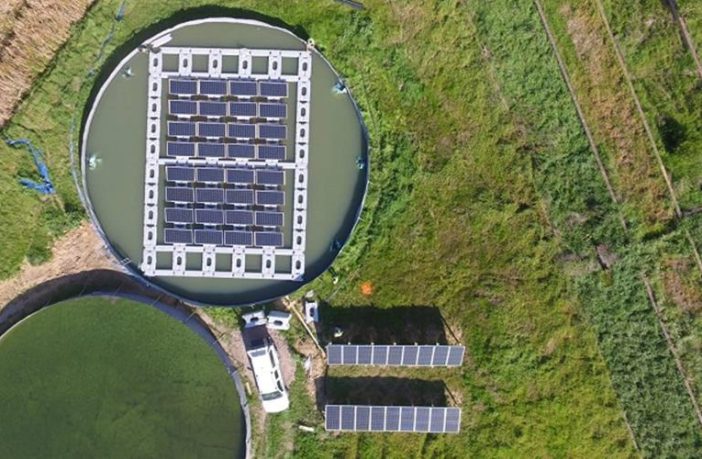- The City of Cape Town has become the first municipality to install a floating solar photovoltaic (PV) system with partners Floating Solar (Pty) Ltd, the Water Research Commission and the University of Cape Town.
- The floating solar PV pilot, which has been established at the City’s Kraaifontein Wastewater Treatment Works, includes a floating solar PV array as well as a ground-mounted PV system to determine evaporation savings and relative energy generation performance of floating solar PV technology.
- This is an innovative research study where data is being collected over a 12-month period to potentially inform the design of larger utility scale floating solar PV projects over the next few years through competitive bid processes
The floating pilot system consists of a 3.51 kWp floating solar PV system with three phase inverter. Two identical tanks (20m in diameter) including a water supply system: one reservoir is covered by a floating solar PV system and the other reservoir is uncovered as a control. The one reservoir is covered using the HYDRELIO® AIR technology with a four-per-row configuration. Water levels in each reservoir is being monitored with a float switch. When the water level drops below a predetermined point, a pump will be turned on and water fed back into the reservoir. The volume of water will be measured by a flow meter and recorded.
The ground mounted system has the same capacity of 3.51kWp for direct comparison using instrumentation and equipment required for the experiment (ambient temperature and humidity sensor, pluviometry, solar irradiance sensor, data logger, wind speed and direction sensor). Instruments installed on the solar PV panels (energy generation monitoring system and temperature sensor).
“This exciting pilot project not only looks at the amount of energy that can be generated by floating panels, but also investigates how much can be generated compared with the ground-mounted panels. The other important pillar of the research is to see what impact the floats have on water evaporation. Generating clean power and reducing evaporation rates of water bodies could be a great double-win for sustainability. This type of project is a tangible example of how we can build a more sustainable future city and how the green economy can be harnessed for the sustainable, and inclusive, economic recovery we require especially after Covid-19,” said the City’s Mayoral Committee Member for Energy and Climate Change, Councillor Phindile Maxiti.
Author: Bryan Groenendaal













